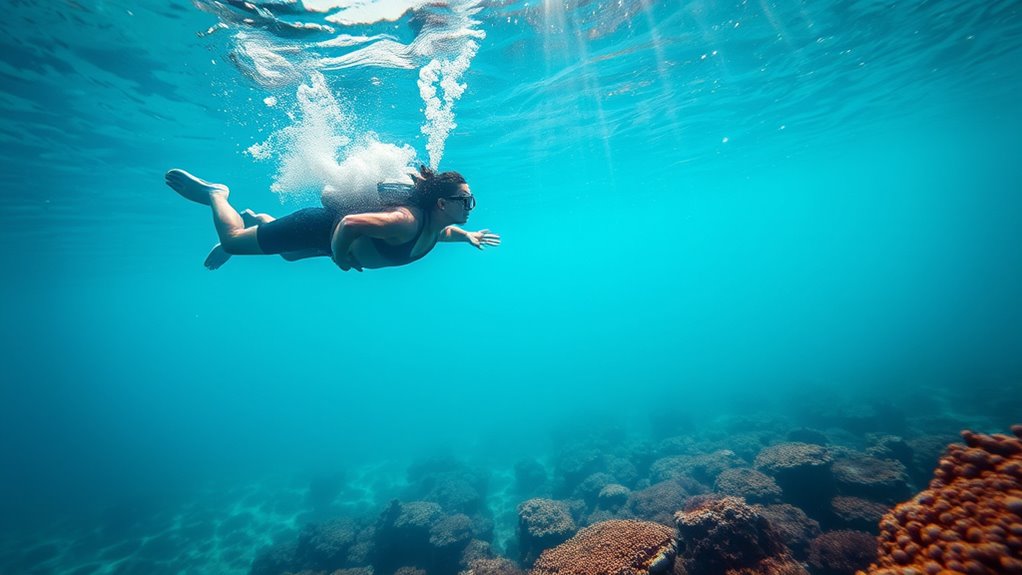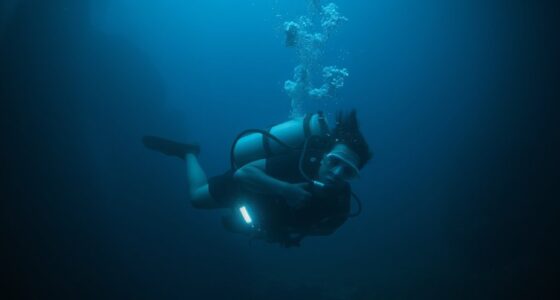To excel in free diving, focus on mastering breath control and equalization techniques. Start with breath hold training on land, using deep, diaphragmatic breathing to enhance relaxation. When you shift to water, practice your breathing techniques just before diving and descend in a relaxed posture. Don’t forget to equalize early and often. This combination of techniques not only increases your underwater confidence, but it also improves your overall performance. Discover more tips to elevate your skills!
Key Takeaways
- Practice deep, diaphragmatic breathing on land to enhance lung capacity and relaxation before free diving.
- Equalize early and often during descent to alleviate pressure and prevent discomfort in the ears.
- Maintain a relaxed posture while diving to optimize breathing efficiency and comfort underwater.
- Incorporate visualization techniques to mentally prepare for dives and reduce anxiety about breath holding.
- Monitor body signals carefully, focusing on composure and relaxation to extend breath hold times effectively.

When you plunge into the world of free diving, mastering the right techniques can enhance your experience and safety. One of the essential skills you’ll need to develop is effective breath hold training. This isn’t just about holding your breath longer; it’s about understanding how your body reacts underwater and learning to control your breathing patterns to maximize your time below the surface.
Start by practicing breath hold training on land. Find a comfortable place to sit or lie down; you want to be relaxed. Begin with deep, diaphragmatic breathing. Inhale deeply through your nose, allowing your abdomen to expand, and then exhale slowly through your mouth. Repeat this process until you feel calm and centered. Once you’re comfortable with deep breathing, try to hold your breath. Inhale deeply, then take a moment to pause before exhaling. Time yourself and gradually increase your breath hold duration as you become more proficient.
Incorporating relaxation methods into your training can markedly improve your breath hold capabilities. You might find visualization helpful. Picture yourself floating effortlessly underwater, feeling at peace with your surroundings. This mental imagery can help reduce anxiety and enhance your ability to stay calm while holding your breath.
As you practice, pay attention to your body’s signals. When you first start, you might feel the urge to breathe quickly, but it’s vital to remain composed. Focus on relaxation; the more relaxed you are, the longer you’ll be able to hold your breath. Techniques like counting slowly or reciting a mantra can also help keep your mind engaged and distracted from the need to breathe.
Once you’ve built a solid foundation with your breath hold training and relaxation methods on land, it’s time to shift to the water. Start in shallow depths where you can feel comfortable. Practice your breathing techniques right before you dive. Inhale deeply, exhale slowly, and when you’re ready, dive down, maintaining a relaxed posture. Remember to equalize early and often to avoid discomfort as you descend. Utilizing emotional triggers in your training can create a more profound connection to your underwater experience.
With consistent practice and a focus on both breath hold training and relaxation methods, you’ll not only enhance your free diving skills but also enjoy the underwater world with confidence and ease. Embrace the journey, and let your breath guide you through each dive.
Frequently Asked Questions
What Equipment Do I Need for Free Diving?
For free diving, you’ll need some essential equipment. Start with a wetsuit for warmth and buoyancy, along with fins for efficient swimming. A mask and snorkel are vital for clear vision and breathing at the surface. Don’t forget a weight belt to help you descend. Safety gear is equally important, like a dive flag for visibility and a buddy system to guarantee safety. With the right equipment, you’re set for an exciting adventure!
Is Free Diving Safe for Beginners?
Yes, free diving can be safe for beginners if you take the right precautions. Start by practicing proper breathing techniques to enhance your comfort and lung capacity. Mental preparation is also vital; visualize your dives and stay calm underwater. Always dive with a partner and stay within your limits. Taking a course with a certified instructor can help you learn essential skills and guarantee you dive safely while enjoying the experience.
How Do I Choose a Free Diving Instructor?
Choosing a free diving instructor is like selecting a captain for your underwater journey. Start by looking for someone with solid credentials and experience. Ask about their breathing techniques and equalization methods; a good instructor should explain these clearly. Read reviews from previous students to gauge their teaching style. Finally, trust your instincts—if you feel comfortable and confident, you’ve likely found the right person to guide you beneath the waves.
What Are the Health Benefits of Free Diving?
Free diving offers several health benefits, including improved lung capacity and enhanced mental relaxation. As you practice, your lungs adapt, allowing you to take in more oxygen, which benefits overall respiratory health. The calming underwater environment helps reduce stress, promoting mental clarity and focus. Engaging in this activity regularly can also boost your cardiovascular health, making it a holistic exercise that nurtures both your body and mind while providing a unique sense of tranquility.
Can I Free Dive Without Prior Experience?
Yes, you can free dive without prior experience, but it’s essential to start safely. Focus on breath hold training and relaxation techniques to prepare your body and mind. Practice these skills in a controlled environment before venturing deeper. Consider taking a beginner’s course to learn proper techniques and safety protocols. Always dive with a buddy, and never push your limits. Enjoy the journey and embrace the underwater world at your own pace!
Conclusion
In summary, mastering free diving techniques like proper breathing and equalization can enhance your underwater experience considerably. Did you know that the average person can hold their breath for about 30 seconds, while trained free divers can often exceed 4 minutes? With practice and the right techniques, you can push your limits and explore the ocean’s depths like never before. So, gear up, take a deep breath, and plunge into this exhilarating adventure!










